Above article is courtesy freep.com newspaper archive. Copyright 2020. Newspapers.com
The above newspaper ad feature was ‘clipped,’ saved, and digitally imaged from the credited source by Motor City Radio Flashbacks.
![]()
FOURTEEN WEEKS overall on the singles pop charts, “Come See About Me” by the Supremes peaked this week at #1 (1 week) on the Billboard Hot 100. Beginning December 13 through week ending, December 19, 1964. (Source: Billboard Pop Annual)
For our previous Billboard 1964 Number One U.S.A. Hits go HERE
_______________
![]()
_______________
THIRTEEN WEEKS overall on the singles pop charts, “Baby Love” by The Supremes peaked at #1 on October 31 (4 weeks) on the Billboard Hot 100. Beginning October 25 through week ending, November 21, 1964. (Source: Billboard)
For our previous Billboard 1964 Number One U.S.A. Hits go HERE
_______________
![]()
 Motown Convention Hypes 1970 Fall Happenings ala San Francisco Chartered
Motown Convention Hypes 1970 Fall Happenings ala San Francisco Chartered
 SAN FRANCISCO — Motown disclosed sweeping sales increases on all fronts during its sales convention here last week prior to unveiling an impressive 37-LP new fall product release.
SAN FRANCISCO — Motown disclosed sweeping sales increases on all fronts during its sales convention here last week prior to unveiling an impressive 37-LP new fall product release.
The meeting here marked the firm’s 10th anniversary and also served as the company’s first international convention attended by representatives from its affiliates in the U.K., Holland, Canada, Mexico, Australia and Japan, in addition to its U.S. distributors and their wives.
Phil Jones, Motown’s director of sales, told distributors that the company’s total singles sales during the first six months of 1970 increased by 14.7 per-cent over the same period of 1969 despite the fact that there were three fewer releases this year.
He said that the average sale per singles release during the past 12 months amounted to 618,000. The total percent of singles sales increase since 1960, Jones said, reached 2,400 per-cent.
Jones said that 18 out of 24 singles released during the first six months of this year made the charts, giving Motown a batting average of .750.
In the tape field, Motown showed a 70.8 percent increase during the first half of this year over sales for the same period of 1969, according to Jones. He said that his firm was one of the first to handle its own tape CARtridge production and helped pioneer the field. He said that since 1966, the four -year period showed a 2,600 percent sales increase in Motown’s prerecorded tape product.
On the album front, Jones said, the first six months of this year showed a 37.1 percent LP sales increase over the like period during 1969. Since 1961, the company’s LP sales have increased 5.600 percent, Jones said.
Among the incredible statistics Jones tossed at the distributors was Motown’s 10-year singles chart batting average. Jones said that during Motown’s decade the company released 535 singles. Of these, 357 made the charts, giving it a percent- age of 66.7 of all the singles it has released hitting the charts.
In announcing the new fall product, Motown revealed it was adding a new label, Black Forum, which will be devoted to “the presentation of ideas and voices of the worldwide struggle of black people to create a new era. Black Forum also serves to provide authentic material for use in schools and colleges and for the home study of black history and culture.”
Three LP’s were introduced in launching the Black Forum line. These consisted of a Dr. Martin Luther King Jr. album dealing with his opposition to the Viet Nam war, an album featuring black poets Langston Hughes and Margaret Danner, and an LP devoted to Stokely Carmichael.
Fall Product
The fall product array included a Temptations Greatest Hits LP and a Martha Reeves & the Vandellas album on the Gordy label; Earl Van Dyke, Jimmy Ruffin, Jr. Walker and the All Stars, the Ruffin Brothers, The Originals, and Gladys Knight & the Pips on Soul; the VIP line offered LP’s featuring Chuck Jackson, a new group called the Hearts of Stone, and an album by the Spinners produced by Stevie Wonder. On the Rare Earth label, new LP’s included a release by a new English group, Sounds Nice (the group was named by Paul McCartney), and albums featuring Power of Zeus, Lost Nation which was produced by Ollie McLaughlin, Holland’s top chart riders The Cats, who will be on tour in the U.S. this fall, the Poor Boys, and Rare Earth.
An eight-LP release on the Motown label will feature the Jackson 5, the Supremes, the Four Tops, an album packaging the Supremes with the Four Tops and the Magnificent 7, Gordon Staples and the Strong Things, volumes 1 and 2
of a new series called Chartbusters (this features a gold foil package with only the color of the type on the sleeve being changed from one release to
the next for easy identification purposes), with each Chartbuster package featuring established Motown names, and an album of Diana Ross to round out the Motown label portion of the fall offering.
On Tamla, the new release included albums by the Marvelettes with this LP produced by Smokey Robinson; Marvin Gaye in a package of his 16 biggest sellers; and an album of Smokey Robinson and the Miracles.
The Chisa label features Letta, the Hugh Masekela South African discovery.
4 Yule Packages
In addition to these LP’s, the firm unveiled four Christmas packages. These featured Yuletide product by the Temptations (Gordy), an album of various artists on Motown (Diana Ross and the Supremes, the Temptations, Stevie Wonder, Smokey Robinson and the Miracles), Smokey Robinson & the Miracles (Tamla), and the fourth holiday package, the Jackson 5 (Motown). Tom Schlesinger, in charge of the firm’s graphics supervision, was credited with producing the sales presentation.
The meetings convened on Aug. 28 and were concluded Aug. 31 afternoon. They consisted of a well organized schedule of activities, highlighted by a banquet and show on Aug. 30. The show featured performances by Jimmy and David Ruffin, the Four Tops, Gladys Knight and the Pips, and following the intermission, Rare
Earth and the Jackson 5.
Bobby Darin, newly signed to Motown, and Smokey Robinson were co-masters of ceremonies.
Each performer brought a standing ovation. The last two acts on the bill brought the house down. Despite the late hour, the distributors applauded loud and long for the Jackson 5 clamoring for more.
Berry Gordy Jr., Motown’s president, addressed the distributors and members of his own company prior to the show stressing that the company was celebrating its 10th anniversary. He recalled the circumstances surrounding the birth of Motown, and related some of the milestones in its growth. His brief talk was comprised of a mixture of nostalgia and humor.
Welcoming remarks to all assembled were delivered by Barney Ales, Motown’s executive vice president and general manager. Ales singled out the presence of international representatives at the convention, and then introduced Gordy.
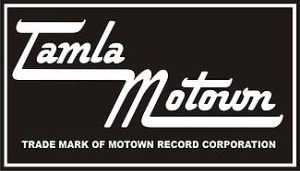 Among the guests attending the festivities were Mr. and Mrs. Berry Gordy Sr. Representatives from abroad included from the U.K. Ken East (EMI), Philip Brodie (EMI), John Reid (EMI), John Marshall (from the London Tamla-Motown operation), and Bill Fowler (Carlin Music).
Among the guests attending the festivities were Mr. and Mrs. Berry Gordy Sr. Representatives from abroad included from the U.K. Ken East (EMI), Philip Brodie (EMI), John Reid (EMI), John Marshall (from the London Tamla-Motown operation), and Bill Fowler (Carlin Music).
Other international representatives attending were George Barlow (EMI), Australia; John Bush (EMD, Mexico; Gerry Oord (EMI) and Pete Felleman (EMI), Holland, and Don McKim (Phonodisc), Canada. Representatives from Japan included Joshihisa Honda (Victor of Japan) and Kazuo Hoshino (Cosdel). END
_______________
Information, credit, and news source: Billboard; September 12, 1970
Note: All photos featured herein courtesy Billboard from issue as dated.
_______________
Click on images for enlargement (PC). Stretch images across your (Mobile) device’s screen for enlarged detailed view.
![]()
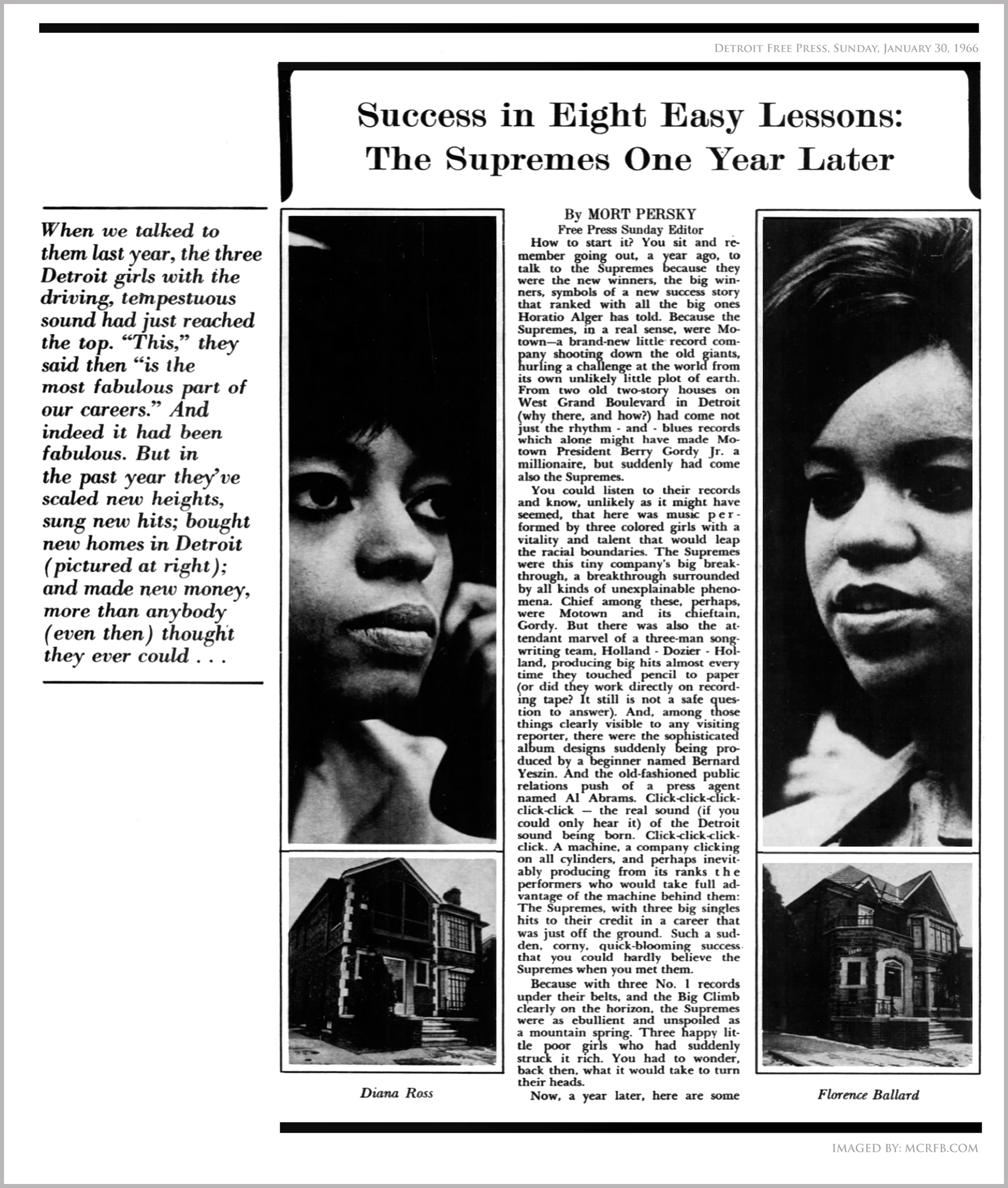
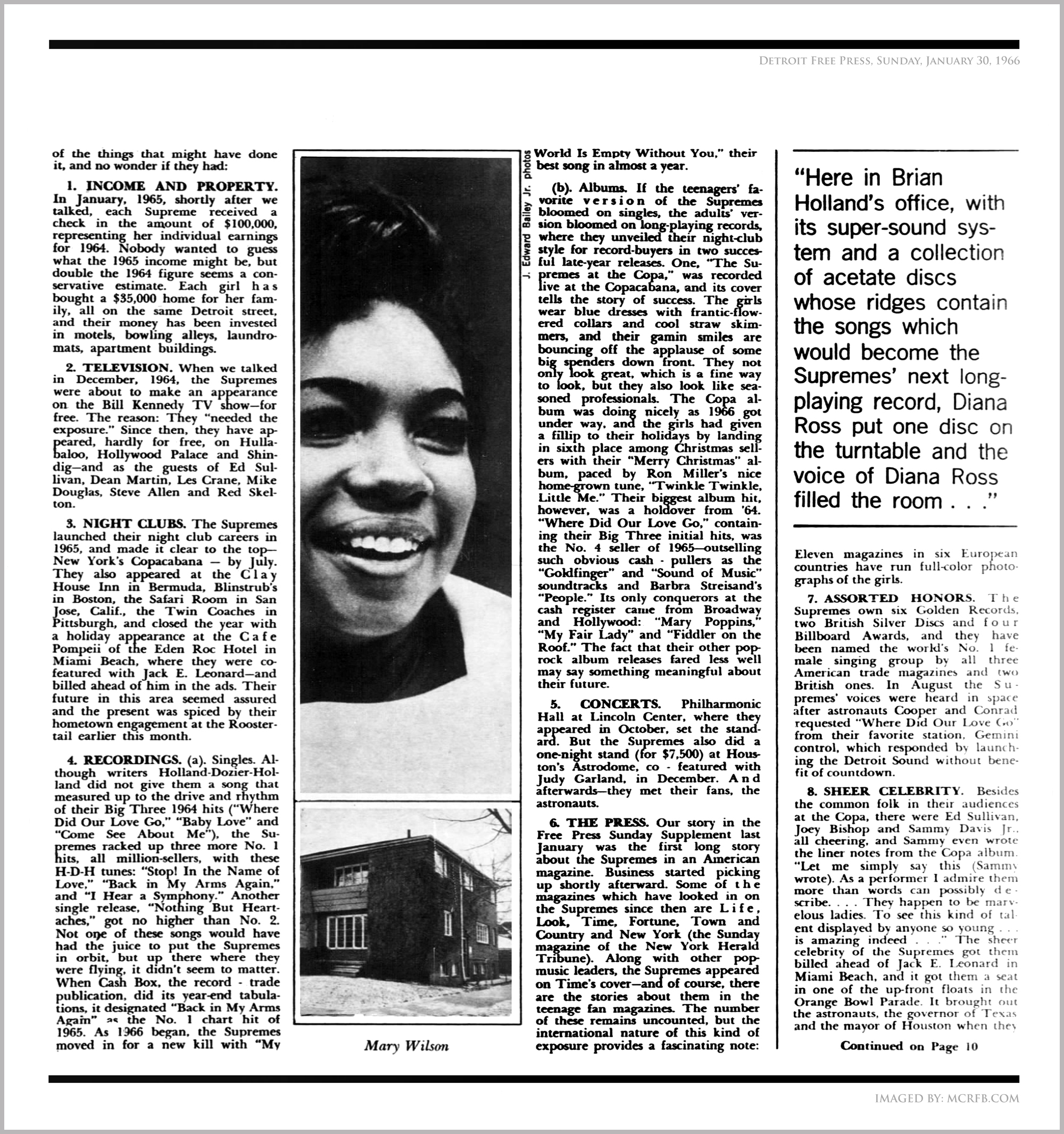
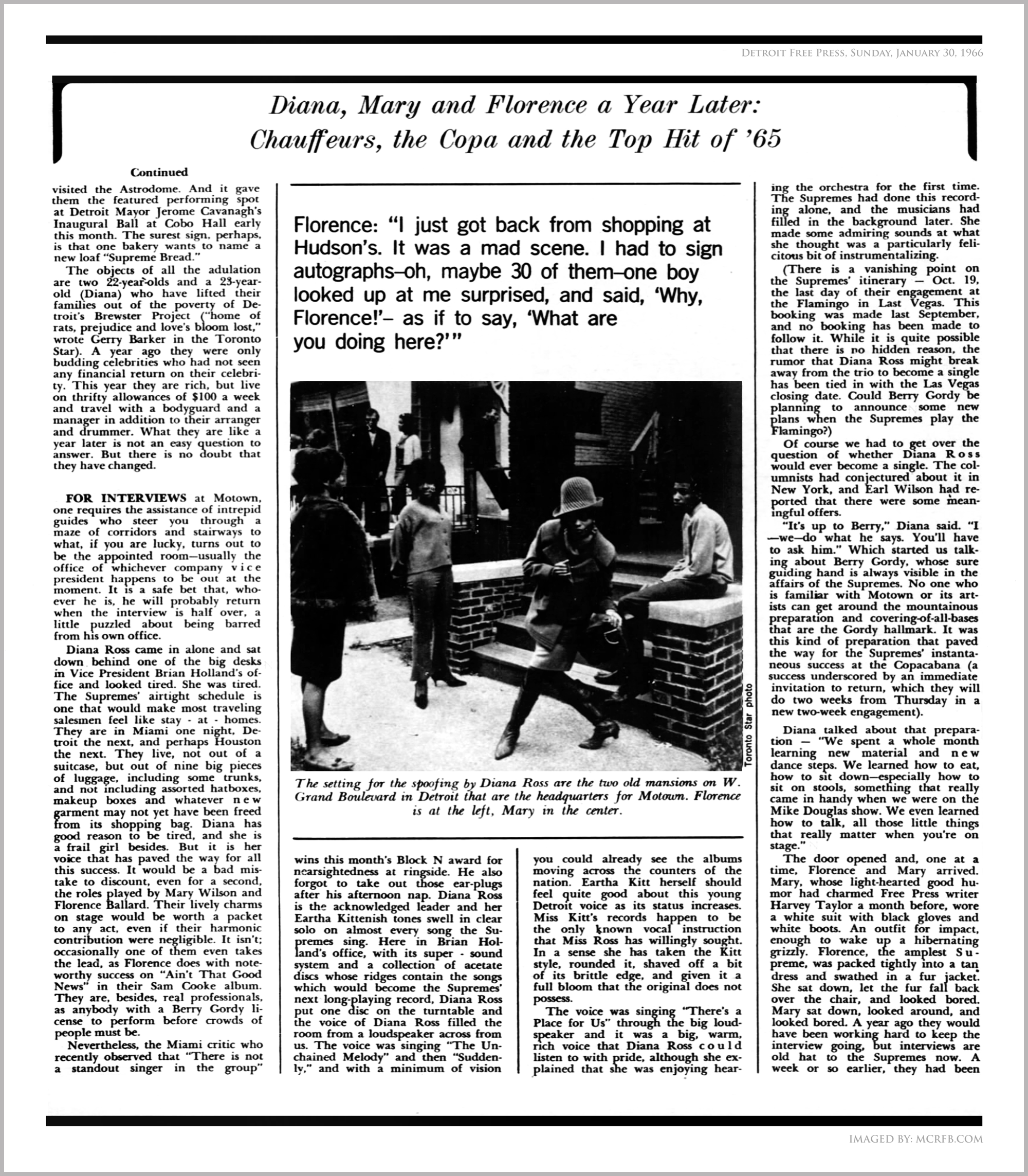
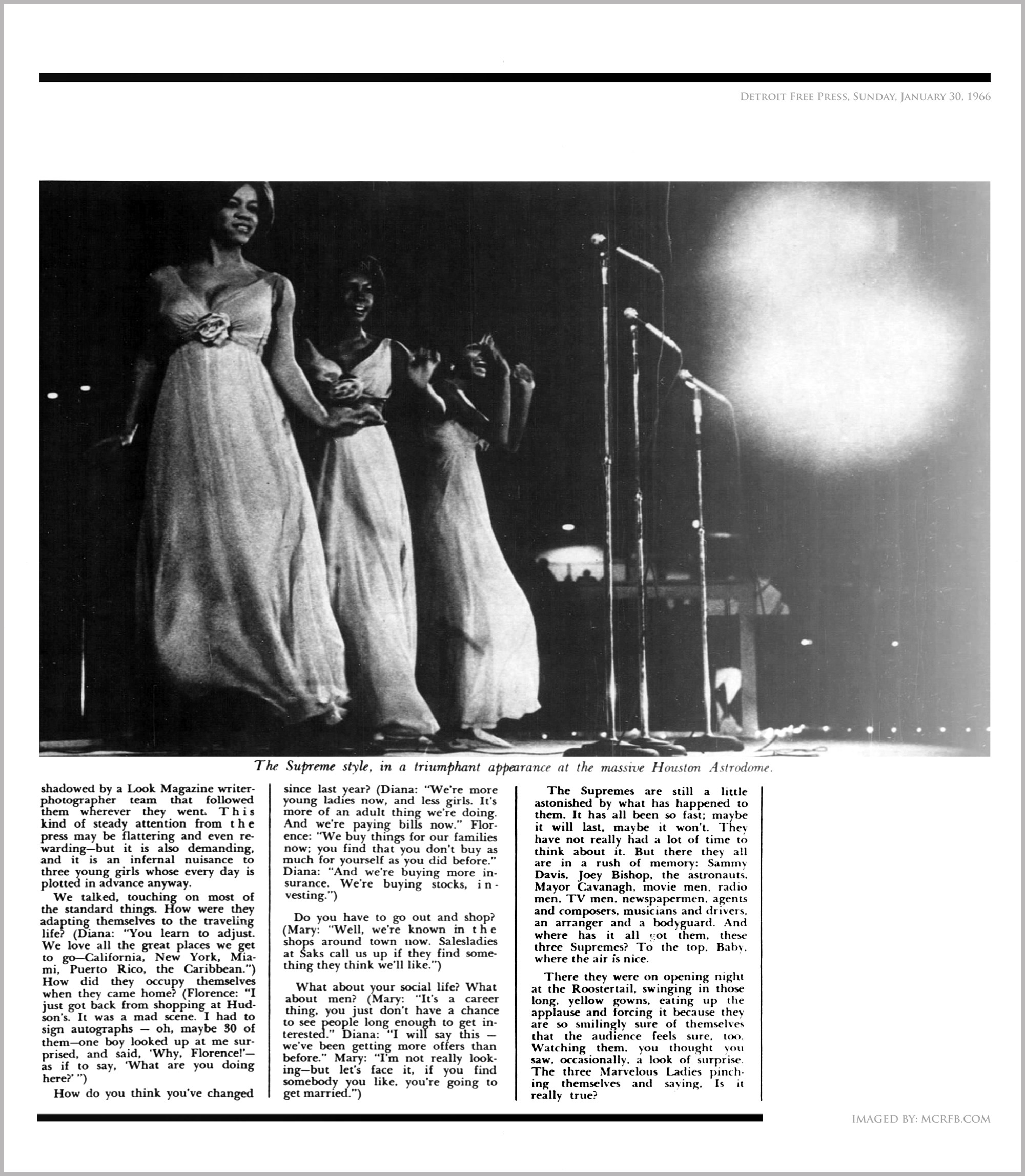
— Sunday, January 30, 1966 —
_______________
Above article is courtesy freep.com newspaper archive. Copyright 2020. Newspapers.com.
The above featured ‘Motown’ newspaper article (Detroit Free Press) was clipped, saved, and digitally imaged from the credited source by Motor City Radio Flashbacks
_______________
Missed any of our previous MOTOWN related news prints? GO HERE
— A VIEWING TIP —
ON YOUR MOBILE DEVICE? Tap over above newsprint images. Open to second window. “Stretch” print image across your device screen to magnify for largest print view.
ON YOUR PC? Click on all images 2x for largest print view.
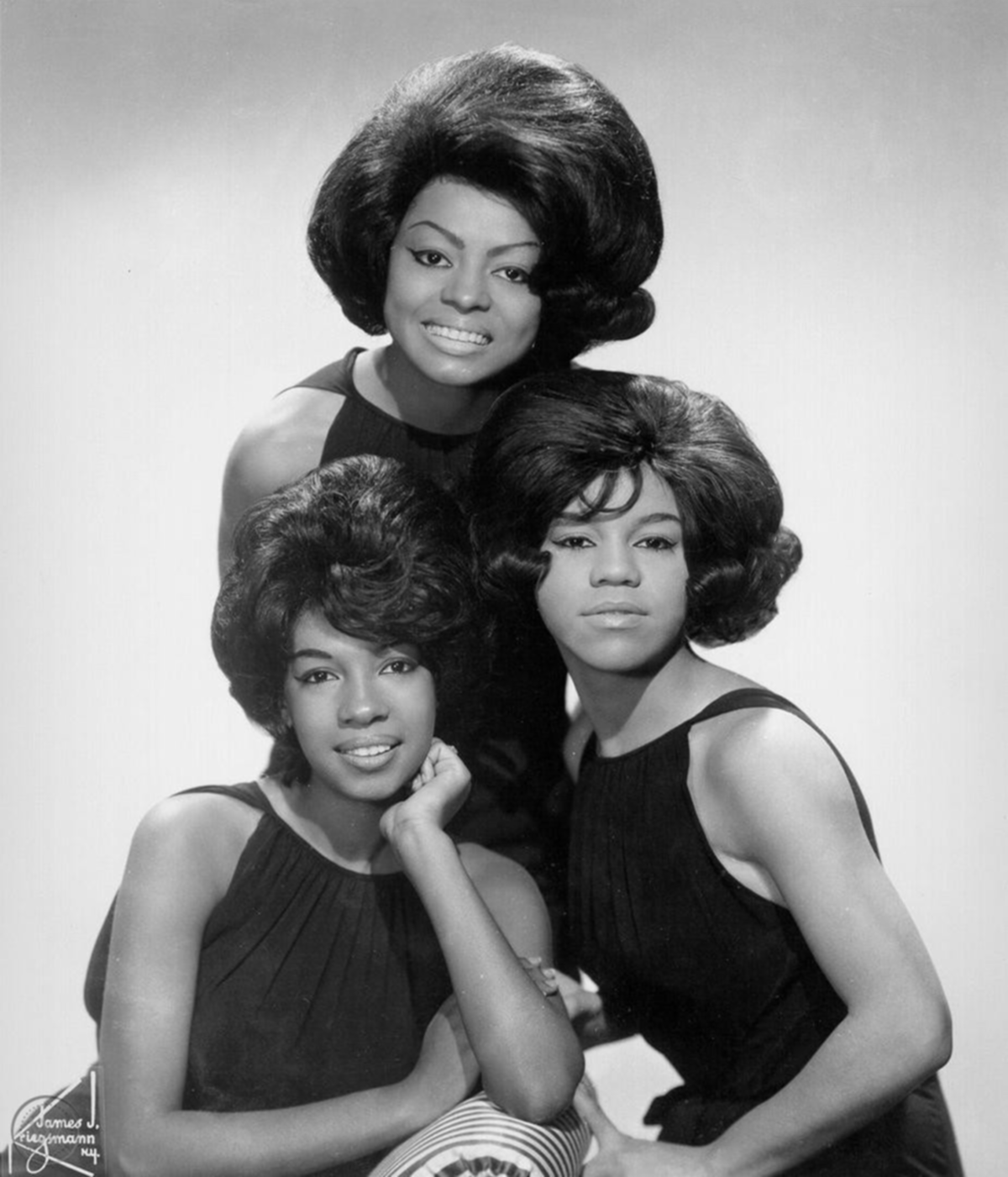
![]()
_______________
FOURTEEN WEEKS overall on the single pop charts, “Where Did Our Love Go” by The Supremes peaked at #1 this week (2 weeks) on the Billboard Hot 100. Beginning August 16 through week ending, August 29, 1964. (Source: Billboard)
For our previous Billboard 1964 Number One U.S.A. Hits go HERE
_______________
![]()
_______________
The Marvelettes was an American girl group that achieved popularity in the early-to mid-1960s. They consisted of schoolmates Gladys Horton, Katherine Anderson, Georgeanna Tillman, Juanita Cowart (now Cowart Motley), and Georgia Dobbins, who was replaced by Wanda Young prior to the group signing their first deal. They were the first successful act of Motown Records after the Miracles and its first significantly successful female group after the release of the 1961 number-one single, “Please Mr. Postman“, one of the first number-one singles recorded by an all-female vocal group and the first by a Motown recording act.
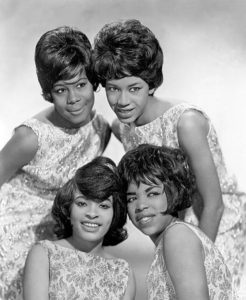
Founded in 1960 while the group’s founding members performed together at their glee club at Inkster High School in Inkster, Michigan, they signed to Motown’s Tamla label in 1961. Some of the group’s early hits were written by band members and some of Motown’s rising singer-songwriters such as Smokey Robinson and Marvin Gaye, who played drums on a majority of their early recordings. Despite their early successes, the group was eclipsed in popularity by groups like The Supremes, with whom they shared an intense rivalry.
Nevertheless, they managed a major comeback in 1966 with “Don’t Mess With Bill“, along with several other hits. They struggled with problems of poor promotion from Motown, health issues and substance abuse with Cowart the first to leave in 1963, followed by Georgeanna Tillman in 1965, and Gladys Horton in 1967. The group ceased performing together in 1969 and, following the release of The Return of the Marvelettes in 1970, featuring only Wanda Rogers, disbanded for good, with both Rogers and Katherine Anderson leaving the music business.
The group has received several honors including induction into the Vocal Group Hall of Fame, as well as receiving the Pioneer Award from the Rhythm and Blues Foundation. In 2005, two of the group’s most successful recordings, “Please Mr. Postman” and “Don’t Mess with Bill” earned million-selling gold singles from the RIAA. On August 17, 2013, in Cleveland, Ohio, at Cleveland State University, the Marvelettes were inducted into the first class of the Official Rhythm & Blues Music Hall of Fame.
The departure of Georgeanna Tillman and renewed success
By 1964, the majority of American vocal groups especially all female bands such as the Shirelles and the Ronettes started struggling with finding a hit after the arrival of British pop and rock acts. In the meantime, other Motown girl groups such as Martha and the Vandellas and the Supremes were starting to get promoted by Motown staff with the Vandellas becoming the top girl group of 1963. The following year, the Supremes took their place as the label’s top primary female group after a succession of hit recordings that year, culminating in the release of their second album, Where Did Our Love Go, which Motown was able to promote successfully. Some sources claim “Where Did Our Love Go” was turned down by the Marvelettes. Gladys recalls “When they played ‘Where Did Our Love Go’ they played ‘Too Many Fish In The Sea‘. We picked ‘Too Many Fish In The Sea’ because it had all the music and all the bongos. We were all together and said at the same time we didn’t want ‘Where Did Our Love Go’.”
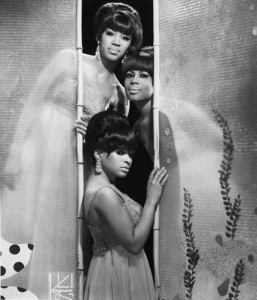
That year, the Marvelettes reached the top forty with the Norman Whitfield production, “Too Many Fish in the Sea”, reaching #25 with the recording. By now, Motown had begun its charm school hiring choreographer Cholly Atkins and Maxine Powell to refine the label’s acts. Atkins began polishing the Marvelettes’ dance moves while Powell taught the group to be more graceful, telling them and every other Motown act that they would “perform in front of kings and queens“. Meanwhile, two of the Marvelettes got married: Georgeanna Tillman married longtime boyfriend Billy Gordon of the Contours and Wanda Young married her longtime boyfriend Bobby Rogers of the Miracles changing her name to Wanda Rogers. By the end of 1964, Georgeanna Tillman, a longtime sufferer of sickle cell anemia was diagnosed with lupus. By early 1965, struggling to keep up with their stringent recording sessions and touring schedules and her illnesses, a doctor of Tillman’s advised her to leave performing for good. The rest of the Marvelettes carried on as a trio from then on.
In mid-1965, Wanda Rogers took over as lead vocalist, as Motown producers felt Rogers’ voice was more suitable for this role than Horton’s. With Rogers as lead, the group had a hit with “I’ll Keep Holding On“, which reached #34 while “Danger! Heartbreak Dead Ahead” settled for a #61 showing but was #11 on the R&B chart. Later in 1965, the group released the Smokey Robinson composition, “Don’t Mess with Bill“, which brought the group back to the top ten reaching #7 and becoming their second single to sell over a million copies. From then on, with Robinson mainly in charge, most of the Marvelettes singles would feature Rogers on lead. In 1966, they had a modest success with “You’re the One” and by the end of that year, they reached the top 20 with “The Hunter Gets Captured by the Game“, which Smokey had to fight to get released. In 1967, the group recorded the Van McCoy composition, “When You’re Young and in Love“, which had been originally recorded by Ruby & the Romantics. The song reached #23 in the U.S. and peaked at #13 in the UK, becoming their only British hit.
 By 1967, Gladys Horton had reconsidered her involvement with the Marvelettes. After her first child, Sammie, was born with cerebral palsy, Horton decided to leave the group entirely, doing so before the release of the hit “My Baby Must Be A Magician“. The song peaked at #17 and was noted for featuring the Temptations’ Melvin Franklin providing the opening line. With Horton out, Harvey Fuqua introduced the group to Ann Bogan who became Horton’s replacement. However, by the time Bogan joined the group in 1968, most of the musicians of Motown’s early years had left, mainly due to financial disputes with the label. The group struggled with recordings after the release of “Magician“, with Motown offering little to no promotion. The 1968 singles “Here I Am Baby” and “Destination: Anywhere” were only modestly successful, peaking at #44 and #63 respectively. The release of their 1969 album, In Full Bloom, failed as did its only single, the remake of Dinah Washington’s “That’s How Heartaches Are Made“.
By 1967, Gladys Horton had reconsidered her involvement with the Marvelettes. After her first child, Sammie, was born with cerebral palsy, Horton decided to leave the group entirely, doing so before the release of the hit “My Baby Must Be A Magician“. The song peaked at #17 and was noted for featuring the Temptations’ Melvin Franklin providing the opening line. With Horton out, Harvey Fuqua introduced the group to Ann Bogan who became Horton’s replacement. However, by the time Bogan joined the group in 1968, most of the musicians of Motown’s early years had left, mainly due to financial disputes with the label. The group struggled with recordings after the release of “Magician“, with Motown offering little to no promotion. The 1968 singles “Here I Am Baby” and “Destination: Anywhere” were only modestly successful, peaking at #44 and #63 respectively. The release of their 1969 album, In Full Bloom, failed as did its only single, the remake of Dinah Washington’s “That’s How Heartaches Are Made“.
_______________
Information and credit source: “The Marvelettes” Wikipedia
Wanda Rogers (acapella)
![]()